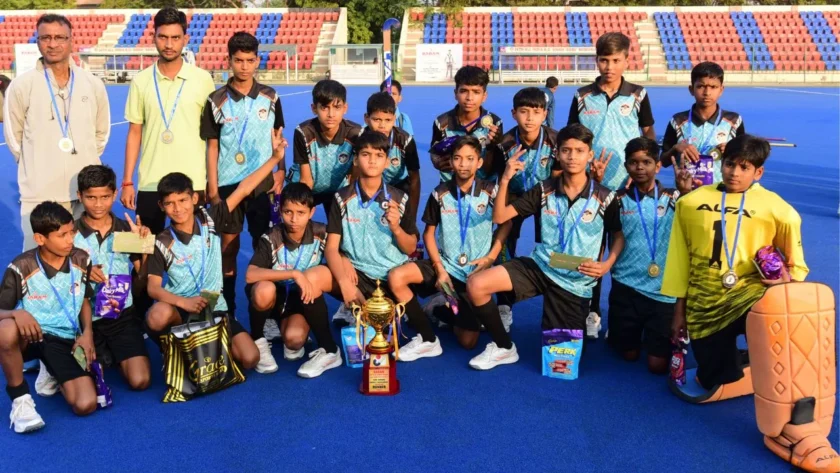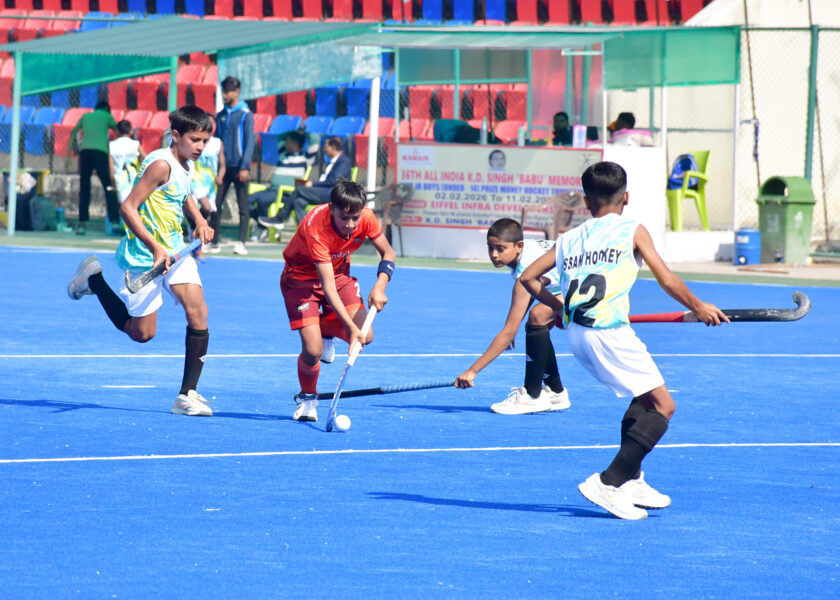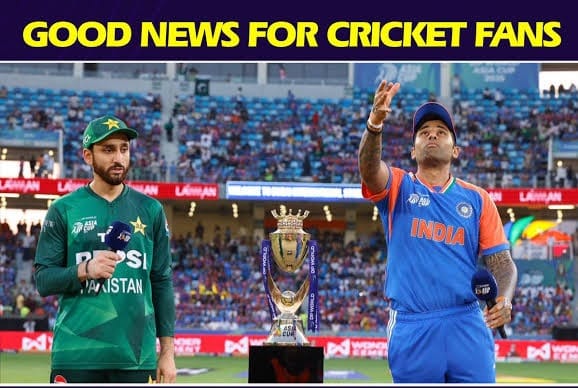Incredible Journey of Kenya’s Running Legend Patrick Sang Highlighted in New Biography
New York/Lucknow— The legacy of legendary Kenyan running coach Patrick Sang, who has been instrumental in shaping some of the world’s greatest long-distance runners, was celebrated in a compelling session at Ekamra Sports Literature Festival marking the launch of a new biography titled The Fastest Runners on Earth. Written by journalist, producer, and athlete Sarah Gearhart, the book dives into the life and philosophy of the coach who has inspired athletes globally.
Gearhart, who flew in from New York for the event, shared insights into the meticulous research that went into the biography. “I spent nearly 11 months in Kenya exploring the unique running culture and understanding Patrick Sang’s methods,” she said. The event also featured Kenyan running royalty Ezekiel Kemboi, a four-time world steeplechase champion and two-time Olympic gold medalist, who lauded Sang’s influence on Kenyan athletics.
The event highlighted the delicate balance between leveraging global opportunities and preserving cultural identity, offering a roadmap for young athletes aiming to excel on the world stage.
Sarah, an acclaimed author and avid runner, shared her experiences and insights about her new book centered on running, the intricacies of writing it, and her future aspirations. Having completed 20 marathons over two decades, Sarah acknowledged that her personal connection to the sport deeply enriched her narrative, allowing her to write authentically about its complexities.
“I think I couldn’t have written this book if I wasn’t a runner. Running for so long gives you a profound understanding of the sport,” she remarked.
The book delves into the life of a prominent figure in running, Coach Sang, renowned for mentoring elite athletes. Sarah recounted her extensive research process, which included in-depth interviews, visits to Sang’s village, and conversations with those who shaped his journey. These efforts helped portray him as “serious, humble, considerate, and really funny,” capturing the essence of a personality that extends beyond his professional achievements.
Looking ahead, Sarah aspires to venture into filmmaking, with ambitions to produce documentaries. Her proposed projects include exploring gender-based violence within Kenya’s women running community—an underreported issue that she believes deserves broader media attention. She also envisions chronicling the journey of an emerging athlete striving to make it to the Olympics.
Her emphasis on gender-based violence stems from alarming statistics, with nearly 40% of Kenyan women reportedly affected. Within the running community, cultural norms often amplify these challenges, with younger women athletes sometimes coerced into relationships with older men who manage their finances and careers. Sarah hopes her storytelling can shed light on these systemic issues, advocating for change.
Sarah also mentioned her current involvement with the World Athletics Championships in Tokyo, where she is part of a video production team conducting interviews with Olympic champions.
Kenyan panelists further highlighted the intense competition faced by athletes in their national trials, where only the top three among a pool of elite runners secure a spot on the national team. “In Kenya, being on the team means being the best of the best,” one remarked, emphasizing the rigorous standards that define Kenyan endurance running.
As Sarah looks forward to bringing untold stories to the forefront, her passion for running and advocacy remains a central theme, bridging sports and social issues in meaningful ways.
Broadcast journalist Shyam Vasudevan, who moderated the session, remarked on the holistic approach Sang adopts. “For him, coaching is not just about the track; it’s about life,” he noted, emphasizing Sang’s philosophy of blending moral values, modesty, and common sense in his training methods.
The Journey Behind the Legend
Patrick Sang, a former Olympic silver medalist and a pioneer in long-distance coaching, is revered not only for his technical prowess but also for his commitment to athlete development beyond sports. Gearhart revealed how Sang’s principles of education and character-building set him apart. “He believes in building complete individuals. For him, it’s not just about winning medals but shaping lives,” she said.
Sang’s refusal to coach anyone who hasn’t completed high school stems from his belief in education as a foundation for character and social skills. “He once said, ‘The last thing you want is a superstar athlete who is out of touch with society,’” Gearhart quoted.
Stories from the Track
Gearhart’s biography also details Sang’s success with athletes like marathon icon Eliud Kipchoge, who refers to him as a “life coach.” Kipchoge credits Sang’s approach for shaping his legendary career, which includes breaking the two-hour marathon barrier.
Adding to the discussion, Kemboi shared personal anecdotes about Sang’s guidance, attributing much of his success to the coach’s unique perspective on training and life.
Gearhart’s Experience in the Field
Gearhart, a seasoned runner herself, has completed over 20 marathons, including endurance challenges in extreme terrains like Namibia’s Kalahari and Namib deserts. Her personal connection to running added depth to her understanding of East Africa’s iconic running culture.
The session concluded with a lively Q&A where Gearhart and Kemboi shared reflections on the challenges and triumphs of Kenyan athletes. As Gearhart aptly put it, “Sang’s story is not just about coaching; it’s about inspiring a way of life that transcends sport.”
The Fastest Runners on Earth is now available worldwide, promising to be an inspirational read for sports enthusiasts and anyone interested in the untold stories behind Kenya’s dominance in long-distance running.
Kenya has long been the epicenter of distance running excellence, with its athletes dominating marathons and international competitions for decades. At the heart of this success lies a unique training environment—a secluded camp in the lush, rolling hills of Kenya. The camp is more than a place for training; it is a sanctuary of discipline, humility, and purpose, producing some of the world’s finest runners like Eliud Kipchoge.
The Champion’s Mindset
At the core of success is belief. One coach shared a key principle imparted to every athlete: “When you’re on the starting line, treat yourself as the best one.” This mindset, coupled with rigorous training, has helped athletes not only compete but dominate on the global stage.
Sarah, a coach and former athlete, emphasized how Kenyan coaches prioritize the mental aspect of running. “It’s not just about focusing on others. It’s about becoming the best version of yourself,” she explained.
Second Chances and Focused Camps
Kenya’s top training camps maintain strict standards, but they also allow room for redemption. Athletes struggling with issues like addiction are often given second chances if they show potential and commitment. “If an athlete isn’t focused, they don’t belong in the camp,” a coach stated, adding, “But we are willing to give someone a second chance because we see their potential.”
A Collective Spirit
Kenya’s running culture is built on unity and shared purpose. The philosophy of “we share the sun,” a phrase embraced during training, reflects a sense of equality and opportunity. This approach fosters collaboration rather than competition among athletes.
“We all share the same sunshine, the same blessings,” explained one coach. “What you do with it matters most.” This interconnectedness, rooted in mutual respect and solidarity, creates an environment that nurtures champions.
Science and Technology Transform the Game
While natural talent and rigorous training remain pillars of Kenya’s success, advancements in technology are reshaping the field. Shoes designed for performance, lighting systems for pacing, and advanced air resistance testing are some innovations giving modern runners an edge.

“During our time, it was all natural,” recalled one former athlete. “Now, technology plays a big role. Records will keep getting broken with these advancements.”
Mastering Technique and Endurance
When asked about the most challenging part of races—especially the grueling final meters—athletes highlighted the importance of mental and physical preparation.
“I had three focuses during training: endurance, speed, and technique,” shared a former steeplechase champion. His unique technique for navigating barriers gave him a competitive edge, allowing him to leave competitors behind at critical moments.
Looking Ahead
The future of Kenyan running remains bright. With science bolstering natural talent and an unyielding focus on discipline, Kenya’s athletes are poised to continue breaking barriers in steeplechase, long-distance, and middle-distance running.
As one coach aptly put it, “Everything is possible with the right training and environment.”
The conversation concluded with a reflection on Kenya’s legacy and the shared belief that, whether in Kenya or across the world, the sun shines equally on all. The difference lies in how each person seizes the opportunity to shine.
The Rift Valley Advantage
The discussion kicked off with insights into the unique geography of the Rift Valley, a high-altitude region famed for producing elite endurance athletes. Panelists emphasized how the valley’s elevation of approximately 2,400 meters above sea level fosters unmatched stamina and resilience. “The Rift Valley isn’t just geography—it’s tradition,” noted one expert. The region continues to draw international athletes seeking the endurance benefits of training at altitude.
Endurance vs. Sprint Dominance
When asked about the divide between East Africa’s dominance in endurance running and West Africa’s supremacy in sprints, the speaker attributed it to regional cultural and environmental factors. “While we focus on marathons and long-distance, sprinters from the West thrive in urban environments and lower altitudes,” they explained.
Patriotism over Profit
The conversation took a heartfelt turn when the marathoner recounted receiving substantial offers from countries like Qatar and Bahrain, enticing Kenyan athletes to compete under foreign flags. Despite offers of up to $2 million, the runner chose to remain Kenyan, citing loyalty and patriotism as guiding principles.
“I could have earned millions, but being Kenyan is priceless,” he said. “Money comes and goes, but your identity and loyalty to your country remain forever. I wanted to wear my nation’s colors proudly, whether I was recognized or not.”
Challenges of a Globalized Athletic World
Sarah Gearheart, a U.S.-based coach, discussed how Kenya’s communal culture fosters unity and synergy among athletes—something that remains challenging in highly individualistic societies like the United States. “Kenya’s system is cultural and deeply ingrained. Recreating that synergy elsewhere is difficult,” Sarah remarked, citing the example of Alberto Salazar’s altitude training experiments in Colorado Springs.
Recognizing Legacy
The session concluded with an inspiring Q&A, where young athletes were reminded to focus on resilience, discipline, and pride in their heritage. Reflecting on his journey, the Kenyan legend stated, “I didn’t stop after my first victory. I kept pushing because I wanted to prove that with determination, you can achieve anything while staying true to your roots.”
Inside Kenya’s Elite Running Camp: A Haven of Simplicity, Discipline, and Purpose
A Modest Training Ground
Far removed from the glitz of modern sports facilities, the camp is nestled amidst vibrant fruit trees and rolling farmland. Built originally to develop young athletes, the camp’s setup remains basic but functional. Accommodations consist of separate dormitories for men and women, while strength training takes place outdoors on yoga mats with simple weights. Occasionally, athletes travel 40 minutes to access a gym. Despite these humble conditions, the camp radiates a cohesive energy described as an “energy vortex” by observers.
Athletes themselves maintain the camp, embodying a strong sense of responsibility. Cleaning, budgeting for food, and general upkeep are part of their daily routines. Even legends like Kipchoge, renowned for breaking the two-hour marathon barrier, contribute by mopping floors after completing grueling runs.
Stripped-Down Success
The camp’s ethos is rooted in simplicity and purity. While Western training often emphasizes technology, gadgets, and advanced gear, the Kenyan approach focuses on the basics—running shoes, or sometimes none at all. This minimalist approach reflects a belief in the essence of the sport, demonstrating that success stems from commitment and focus rather than material excess.
“The purity of the sport here is unmatched,” said one observer. “At its core, all you need is determination and shoes—if even that.”
The “Why” Behind the Greatness
A recurring theme in the camp is the focus on understanding one’s “why.” Athletes are encouraged to reflect on their purpose—the driving force behind their relentless training. For many, like champion runner Eliud Kipchoge, the “why” extends beyond personal achievement. Kipchoge’s foundation, for instance, aims to enhance education by building libraries and fostering environmental conservation through tree planting.
Such initiatives illustrate how Kenyan runners use their success to give back to their communities, embodying the holistic philosophy instilled by their coaches.
A Holistic Approach to Training
The camp’s coaching philosophy extends beyond athletic performance. Education is a cornerstone of its values. Athletes are required to complete their schooling before joining, ensuring they have a fallback plan if their running careers falter. Coaches emphasize the importance of life skills, instilling a sense of responsibility and balance in their trainees.
“Running is just one part of who you are,” noted a coach. “Education equips athletes for the future and ensures they remain grounded.”
The Legacy of Discipline
The camp’s culture of discipline and teamwork is evident in the camaraderie shared among its athletes and coaches. Relationships transcend competition, fostering a supportive environment that nurtures both personal and professional growth. Coaches from the same town, like Patrick Sang and Moses Kiptanui, share insights and collaborate to mold well-rounded athletes.
Beyond the Numbers
Kenyan runners are often celebrated for their speed and endurance, but their journey is about more than medals. Their commitment to their craft, their communities, and their environment highlights the profound impact of purpose-driven training. As the world marvels at their achievements, Kenya’s running camp stands as a testament to the power of simplicity, humility, and an unwavering sense of “why.”
In a world obsessed with technology and innovation, the Kenyan model serves as a reminder: greatness often emerges not from what you have, but from what you believe in and work for every single day.
The journey to athletic greatness often starts with inspiration and guidance, and Kenya remains at the heart of long-distance running success. In a recent discussion, renowned Kenyan coaches and former athletes revealed the philosophies, challenges, and advancements that make Kenya’s runners among the best in the world.










